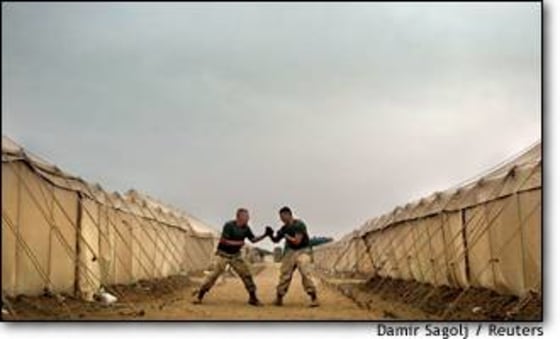For many of the quarter million soldiers currently in battle position across the gulf region, the wait for orders to attack Iraq has stretched over many months. But while the troops — many in combat for the first time — wait for an end to the diplomatic negotiations in the U.N., they are anything but idle.
Desert operations exact a high toll from military gear, and maintenance is a large part of every day’s activities. Troops clean weapons daily, whether they are fired or not, and vehicles and tanks require constant attention.
Units in the theatre repeatedly rehearse the missions they will perform while at war, refining the skills developed at their home stations in America. Over the last few decades, the military has made enormous strides in training effectiveness. Ground combat units carry out a large portion of their exercises in live-fire environments, simulating actual combat as closely as possible. To ready for a conflict with Iraq, most of the combat and combat support units in the gulf attended training at the National Training Center at Fort Irwin, California, where the high desert terrain is similar to the conditions in Iraq.
CHEMICAL BIO THREAT
The added threat of Iraq’s chemical and biological weapons often requires troops to train in full protective gear. Perhaps nothing generates as much trepidation as the prospect of being on the receiving end of a chemical weapon attack, and there is a palpable feeling of the impotence that its potential use causes. Aimed rifle and machine gun fire can be frightening and artillery fire can certainly hit random targets, but chemical weapons can be utterly indiscriminate and devastating.
Although troops have a great deal of confidence in their protective gear and it is checked frequently, a seemingly insignificant oversight could be catastrophic: a pinhole here, an imperfect seal there, and the consequences can be enormous. The troops are not ignorant of the risk and it magnifies the fear they already feel.
The uncertainty of weapons of mass destruction is only one of the many challenges facing military leaders in the gulf region. Until recently, the heat has been tolerable, but as summer nears, it is becoming increasingly hot during the day, and daytime training and activities may be limited somewhat. Soon, daytime temperatures will soar, and although the forces can train and fight in this environment in protective gear, they will be neither very happy about it nor particularly effective.
MAINTAINING MORALE
The long delay in commencing large-scale operations against Iraq has been a boon to the strategic plan for an invasion, but it has made the maintenance of morale for battle-ready troops something of a challenge. With several divisions not yet in the theater of operations, this gift of extra time permits both a more orderly deployment and an extension of vital special operations inside Iraq.
However, trying to maintain a unit’s finely honed edge will become more difficult the longer troops are forward-deployed and uncommitted. In addition, a significant fraction of the force comes from reserve and National Guard units, many of whom have been on active duty for months on end.
They are hard-working, skilled and dedicated, but one must assume that if they wanted to be full-time service people they would have stayed on active duty and not embarked on civilian careers, now left behind for an indefinite period.
Particularly for combat troops, perhaps the greatest uncertainty is self-confidence under fire. No matter how well trained and experienced, every soldier has doubts about himself. No training exercise, no matter how realistic, can fully simulate the nature of actual combat, and each soldier, sailor, airman and Marine knows this.
The confusion, the deafening noise, the uncertainty, the pain, the death — all of these are feared. But perhaps the soldier’s greatest fear is that of not being able to perform properly under fire, that fear itself will destroy the individual will to do one’s duty, complete the mission, support buddies.
Leaders do what they can to maintain confidence by providing the best possible equipment and training, leading by example, solving problems and massaging egos. Experienced soldiers know that troops fight for a worthy cause — for country, for freedom — but in the end, the best guarantor of success is a cohesion born of mutual respect and the love and friendship that can only be forged in combat.
Right now, in hundreds of military units, brave but fearful young people will soon learn that the best way to excel and survive is to rely on each other.
(Col. Jack Jacobs (U.S. Army retired) is an MSNBC military analyst.)
